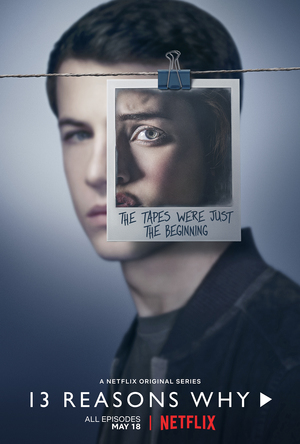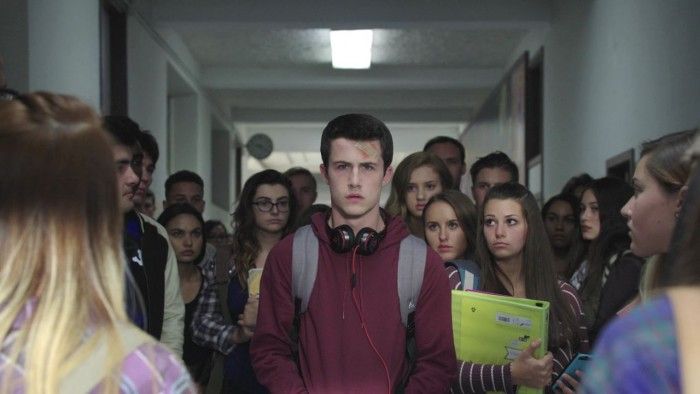Professionals from around the world are urging parents to watch the newly-released second season of the controversial Netflix show with their teens, amidst worries that young people may feel unable to talk about sensitive issues raised
One of 2017’s top trending shows has just released its second season. To coincide with the second season of the controversial young adult drama, 75 leading mental health, suicide prevention, healthcare and education professional organisations from around the world have collaborated to create a toolkit. The 13 Reasons Why Toolkits, designed for parents, young people, educators, clinicians and the media, encourage viewers to start conversations and hopes to help identify those at risk and help them seek appropriate support.
Brought together by Suicide Awareness Voices of Education (SAVE) collaborators include the British Psychological Society (BPS) and leading UK suicide prevention charity Samaritans.
Parents can find advice about how to talk with children about suicide, school shootings, substance abuse, sexual violence and bullying. Links to charities and organisations offering support around the world, as well as further toolkits for advice and support are highlighted to help parents find relevant, local support.
This isn’t the first set of resources released to support viewers and concerned parents either. Following backlash during its first season, the show released its own site, 13 Reasons Why Info, providing free resources and highlighting places viewers and concerned parents can seek support.
Season two, released May 18th 2018, sets out to continue on from where season one and Jay Asher’s original novel left off.
The truth doesn't always make things right. Season 2 of #13ReasonsWhy is now streaming. pic.twitter.com/OTDMrzwzIt
— 13 Reasons Why (@13ReasonsWhy) 18 May 2018
Airing in March 2017, season one of 13 Reasons Why divided viewers and professionals, with many suicide survivors and mental health professionals widely condemning the show as triggering and unnecessarily graphic.
Despite this, many critics and viewers praised the show for its frank approach and uncomfortably graphic depiction of sensitive issues. Extremely graphic depictions of suicide, rape and bullying divided the shows supporters and critics, with debates primarily focusing around the potentially triggering viewing, the lack of alternatives to suicide presented, and opportunities created for teens to witness unhealthy coping mechanisms and start an open dialogue with parents, educators and their peers. The show announced plans to include trigger warnings before each episode in an effort to highlight potentially upsetting themes.

The original season, adapted from Jay Asher’s best-selling 2007 novel, explored the life of Hannah Baker, recounting the thirteen situations that led to her completing suicide. Key themes expected to continue on between seasons include suicide, bereavement, sexual assault, drug abuse, bullying, and depression.
Mental health experts, whilst concerned about the show’s overly graphic content and triggering subjects, have urged parents to avoid outright banning their children from watching the show. Mental Health Foundation New Zealand and adolescent psychiatrists from BC Children’s hospital, Vancover, warn that young people may not feel comfortable or able to seek help or discuss issues feelings that may arise from watching the show against parental permission.
Dr Ashley Miller, child and adolescent psychiatrist, acknowledged that the show helps open up discussion about mental health for many. Concerns around the sensationalisation and glamorising of suicide are still prevalent.
Experts encourage parents to face their concerns head-on by watching the show together with interested teens. A particular emphasis on making sure young people are aware, and encouraged to talk if they are concerned about themselves, or friends, in regards to issues portrayed in the show has been echoed by experts around the world. Leading mental health advocates have suggested parents and young people shouldn’t hesitate to reach out and seek support from local mental health services, charities and GPs if they are concerned or distressed.
The British Psychological Society, part of the international coalition of 75 mental health organisations behind the toolkits issued a statement urging adults to not only watch the series with young people, but to talk about issues raised and seek guidance from free online resources.
BPS representative Professor Rory O'Connor said:
“I am delighted to be a member of the coalition of organisations who is releasing advice to address the specific topics raised in 13 Reasons Why Season 2. Season one stimulated a lot of discussion among young people globally last year and we are keen to provide advice and support to parents, educators and professionals by way of a toolkit of resources and associated websites. We hope that the toolkit will be helpful in promoting a safe and supportive environment to discuss mental health and suicide.”
According to researchers, following the release of season one of 13 Reasons Why, Google searches related to suicide increased by 1.5 million. Despite this concerning increase, almost 60% of adolescent viewers reported talking with their parents about the shows content, though an alarming 70% of parents and nearly 80% of teens expressed that they wished they had more access to mental health information and resources beyond what was presented by the season one follow up Beyond the Reasons.
If you are concerned about any of the issues raised or wish to find out more about the help and support available, visit Counselling Directory. For urgent support, contact Samaritans on 116 123 (UK) any time or visit Samaritans.


Comments